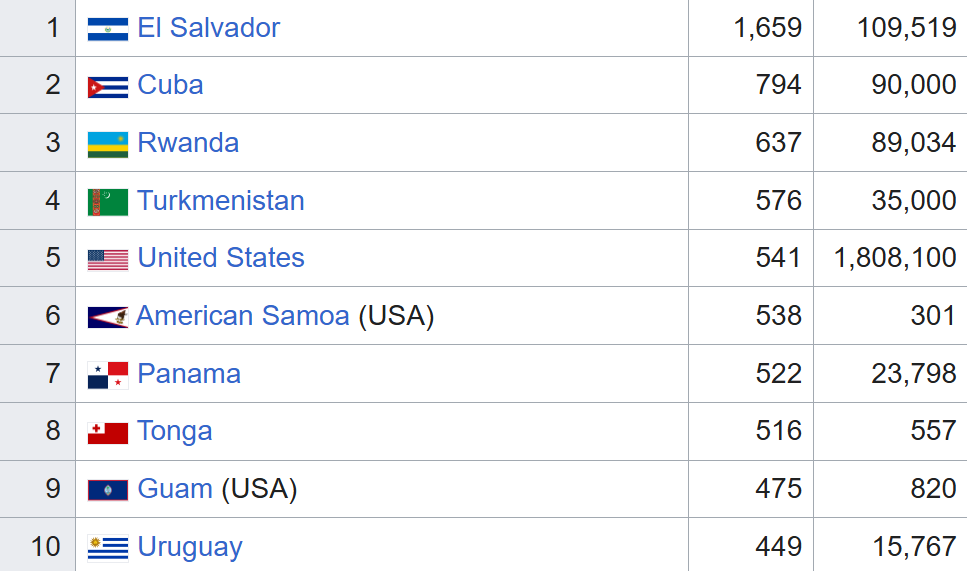>“We’ve made it one year penalty for inciting riots. We took the freedom of speech away, because that’s been through the courts, and the courts said, ‘you have freedom of speech,’ but what has happened is that when they burn the flag it agitates and irritates crowds … and you end up with riots.”
*Donald Trump*
So, while burning the flag is protected by the First Amendment in the US as an expression of freedom of speech, inciting riots comes with a one year penalty. And because burning a flag could incite a riot, it gets an automatic one year penalty?
---

---
># How's this working out for y'all?
It definitely doesn't sound like the "land of the free". More than that, what this means is that anything that could be considered as inciting a riot would then get an automatic one year penalty.
But...
> that can be *anything!*
At the moment, ICE is inciting riots, do they get penalised? What about when police needlessly kill a black person they are arresting? Penalty? What is the definition of incitement and what is the boundary line for what is okay, and where it crosses into incitement? What this means is that the current government can essentially dictate terms over anyone, picking and choosing who they arrest based on whatever flimsy line of incitement they choose at the time. It doesn't matter if it doesn't make it through the courts later, because in the short-term, a person or group of people will be in jail.
> The jail business must be good in the US!
There are around 1.8M people in jail in the US, and this was *before* the anti-immigration arrests. But don't worry Americans, while you have the largest prison population in the world (even more than China who is pretty arresty and has 4x as many people), you aren't the top if considering incarceration per 100,000 inhabitants. You are only 5th. And 6th. And 9th.

> Three in the top ten.
You are in some pretty good company there!
Look, I am not on the ground there so maybe all of this is "fake news" and everything is actually swell in the US at the moment. But, that this kind of thing is even in the news, with national guards mobilising in cities to reduce crime and violence, and threats of arrests of anyone who has spoken against the president, and what targeted withholding of funding from select states and cities, and of course, the government lockdown -
> Another day in paradise?
Does these events touch on the daily lives of the average American, or are they peripheral events that don't really matter to most people, but are good for global news stories? Is the average American worried about their country currently, or is it that people are unaffected by all of this, and life just goes on as usual.
> *Business* as usual.
I am looking forward to the time the Rest of the World performs a "conscious decoupling" from the US economy and chooses to increase consumption instead or relying on a single, debt riddled nation that will keep consuming to maintain power, and maximise wealth for a tiny fraction of people.
As I have said before, while the US is the world's largest consumer, accounting for over 26% of the global total of the economy, it only has about 4% of the world's population. What this means is that if the rest of the world population grew their consumption by a small amount, it would more than compensate for the loss of the entire American market. But, can the average American compensate for that loss?
> No.
Because the US system is not a closed system, as it depends on inflows of goods and more importantly, a huge amount of income, from the rest of the world. Even if all production moved to the US, what would that look like if the rest of the world, which can provide everything for itself if needed, stops trading? What does the US look like as a hermit nation?
> What does the rest of the world look like without US trade?
Lots of disruption for sure. But the thing is with the economy we have, is that disruption is sorely needed, because it just doesn't work. The disruption is going to come anyway, because there is an inevitability to an economy designed to eat itself to the point it starves under the weight of an enormous and growing wealth gap. At least if the rest of the world makes a move now, it undercuts the influence of the US and starts a transition to a more distributed economic model. Not only this, in the short term, there would be a *huge* amount of need to build factories and train people, and ultimately create new industries, like in the improvement of wellbeing.
the rest of the world, instead of being consumers of useless things, could pivot to be consumers of wellbeing goods and services, clean energy, and just better lives. The RoW could get out of the "industrial age" of business where it is all about selling goods and services, regardless of whether they are "good" or "serving" and into a period of things that are *actually good and serving for humanity.*
> The human age.
As I see it in my idealistic world, industry should be rewarded by the improvement in wellbeing it brings to humanity, not on whether they can convince people to buy it or not. The reason is that it is far easier to convince our simple human circuitry to do what is counterproductive for our wellbeing, than what is beneficial for it, whether that be at the individual, or the social level. The richest companies and people in the world should be the ones that provide the most *human value* to society, the best health, the most content people, the maximisation of human beauty and joy.
> It is never going to happen.
Because we seem too content believing that the shitshow that we have now, is the only way it can be.
> *Speak freely.*
If you dare.
Taraz
[ Gen1: Hive ]
---
**Be part of the Hive discussion.**
- Comment on the topics of the article, and add your perspectives and experiences.
- Read and discuss with others who comment and build your personal network
- Engage well with me and others and put in effort
**And you may be rewarded.**
---
i